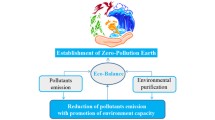
Overview
- Shows the future role of Ecological Chemistry towards a Sustainable Development
- Presents and discuss’ the state-of-the-art of R&D in environmental issues in Eastern and Western Countries and Med Sea Dialogue Countries
- Builds a link and shows how environmental scientists from NATO and NIS countries could cooperate
- Shows emerging fields of and the demands for R&D in NIS and Med Sea countries
Part of the book series: NATO Science for Peace and Security Series C: Environmental Security (NAPSC)
Access this book
Tax calculation will be finalised at checkout
Other ways to access
About this book
Similar content being viewed by others
Keywords
Table of contents (29 papers)
-
Front Matter
-
Organic Pollutants and Pops In The Environment — Occurence, Fate and Prevention Measures
-
Water Pollution and Waste Water Treatment
-
Soil Pollution and Prevention
-
Waste Management
Editors and Affiliations
Bibliographic Information
Book Title: The Role of Ecological Chemistry in Pollution Research and Sustainable Development
Editors: Ali Müfit Bahadir, Gheorghe Duca
Series Title: NATO Science for Peace and Security Series C: Environmental Security
DOI: https://doi.org/10.1007/978-90-481-2903-4
Publisher: Springer Dordrecht
eBook Packages: Earth and Environmental Science, Earth and Environmental Science (R0)
Copyright Information: Springer Science+Business Media B.V. 2009
Softcover ISBN: 978-90-481-2901-0Published: 10 August 2009
eBook ISBN: 978-90-481-2903-4Published: 03 August 2009
Series ISSN: 1874-6519
Series E-ISSN: 1874-6543
Edition Number: 1
Number of Pages: XX, 308
Topics: Monitoring/Environmental Analysis, Environmental Chemistry, Environmental Law/Policy/Ecojustice, Soil Science & Conservation, Waste Management/Waste Technology, Waste Water Technology / Water Pollution Control / Water Management / Aquatic Pollution



